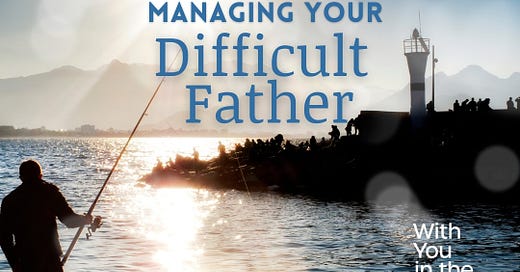Listen now: Managing Your Difficult Father – Series 7, Episode 3
In the third episode of our Managing Your Dysfunctional Family series, John, Shay, and Austin look at why good fathers are so important, and how you can heal even when you’ve been let down or even mistreated by your father. For good or bad, the type of father you have is one of the primary factors that shapes who you are, the way you manage relationships, and how you view God.
There are three ways to better understand your relationship with your father.
The Good: What was the ideal in God’s plan regarding fathers?
The Bad: How do even the best-intentioned fathers let us down?
The Ugly: What happens when fathers are abusive and destructive?
The Good
Despite living in a fallen world where everyone struggles with sin, it’s important to remember that there are good fathers out there, despite their imperfections. Here are three messages that godly fathers can pass on to their children:
“It can be done”: That is, no matter what life brings, it is possible to live a life that honors Christ. A godly father doesn’t pretend that things will be easy. Life is hard, and he knows it, but he is there to encourage and support his children to walk with God through the trials of life.
“You are not alone”: A godly father lets his children know that he is there for them. He listens rather than lectures and invites rather than demands. His words and actions send the message, “You are not alone. I am here for you, and I am listening”.
“I believe in you”: Godly fathers accept their children as individuals: responsible for their own choices and, by God’s grace, capable of making good ones. Having taught their children character traits like honesty, hard work, loyalty, and discernment, they then entrust their children to God and stand by to support them when needed.
The Bad
Many fathers want to be good and loving. For many dads, that means being a good provider – putting a roof over their family’s heads and food on the table. However many dads strive to provide these things without considering that their children need more than material provisions. Children need dads who are mentally present, emotionally accessible, and available to encourage and nurture them.
Fathers who are physically present but not emotionally present can also cause a great deal of hurt – their emotional unavailability communicates to the child, “You're not really important to me.” Children with absentee fathers are more likely to live in poverty, fall behind academically and socially, and struggle with depression and suicidal ideation.
The Ugly
Tragically, many families have patterns of abuse, trauma, and addiction, leading to shame and feelings of low self-worth. Abused children can carry their unhealed wounds into adulthood and find themselves repeating the same behaviors that were done to them. Until the cycle is intentionally broken, abuse can be passed down from generation to generation.
Three Steps to Healing from Your Father-wound
Grieve: If you are in pain because of a father who hurt you, the first thing you can do is allow yourself to grieve. Grieve the fact that you had/have a difficult father and name the ways in which you were let down, disappointed, abandoned, or abused. This is where we would recommend meeting with a qualified therapist, someone who can guide you as you process your feelings about your father.
Look and recall: Look for God’s grace in other places – His word and His people. Who in your life has given you ingredients of a loving father? How have you opened your heart to being fathered - receiving the things from others and from God that you are missing? A deepened awareness of your yearnings for a father could make you aware of the men in your life who have fathered you: perhaps imperfectly and incompletely but still meaningfully.
Activate: If you’re a dad (or hope to be one someday), work towards modeling the real and unconditional love of God to your child. Spend time with your kids – quality and quantity. Get to know them – what things do they enjoy, what are their hobbies and interests? Give them your undivided attention. Forgive them when they mess up, and apologize to them when you mess up. Offer them protection and security. Be ready to listen when they are ready to share.
From Healing to Thriving
Grieving the pain of your father-wound, finding healing and support through others and God, and undoing cycles of generational pain is a tough job. It may be one of the hardest things you ever do – but one of the most rewarding.
Do you enjoy listening to With You in the Weeds? Share this post with a friend and let them know how they can hear substantive content from our experienced team on common counseling questions.
Follow us on Instagram and Facebook and listen on Apple Podcasts or Spotify. Check out our Podcast Topics page for a library of episode content on topics that matter to you, and email us at:






